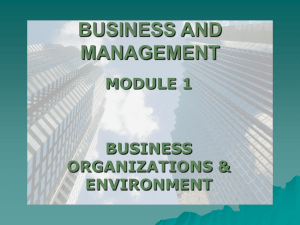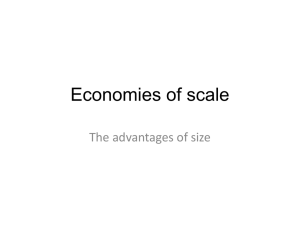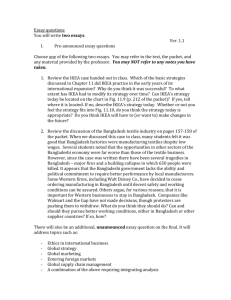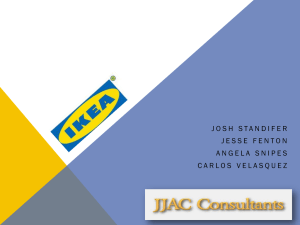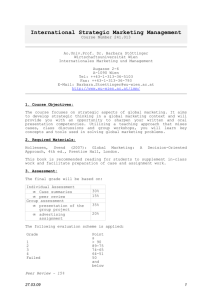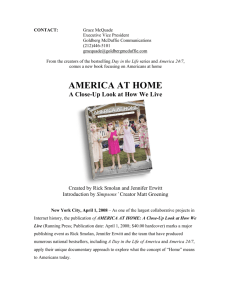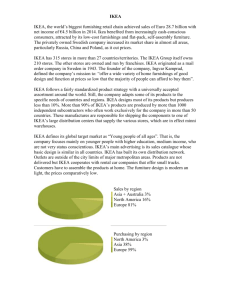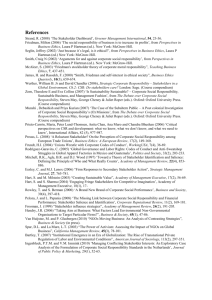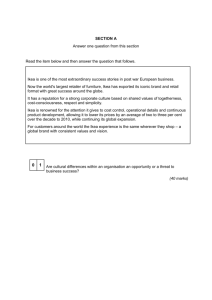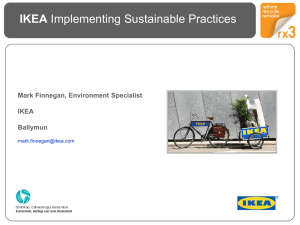Typical Phases of Product Development
advertisement
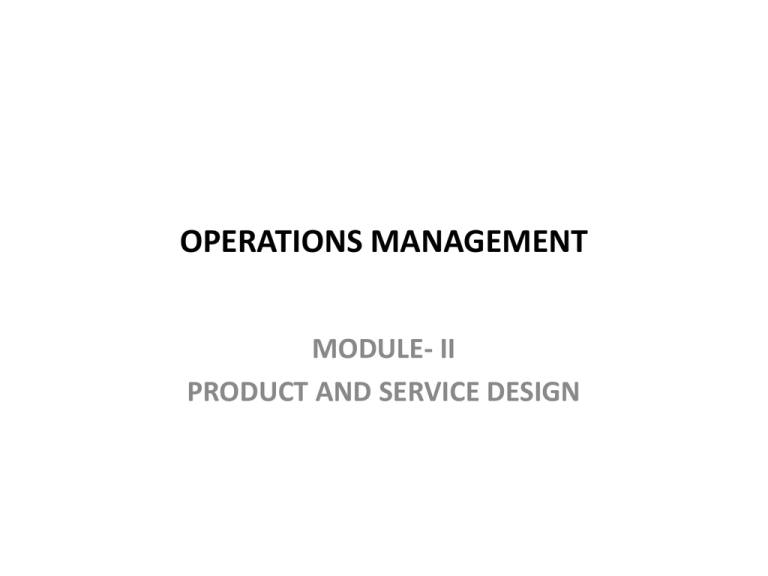
OPERATIONS MANAGEMENT MODULE- II PRODUCT AND SERVICE DESIGN 2-2 Operations and Supply Strategy Framework 2-3 UNDERSTANDING PRODUCTIVITY Productivity is a common measure on how well resources are being used. In the broadest sense, it can be defined as the following ratio: Outputs Inputs 2-4 Total Measure Productivity Total Measure Productivity = Outputs Inputs or = Goods and services produced All resources used 2-5 Partial Measures of Productivity • Partial measures of productivity = • Output or Output or Output or Output Labor Capital Materials Energy 2-6 Multifactor Measures of Productivity Multifactor measures of productivity = Output Labor + Capital + Energy or Output Labor + Capital + Materials 2-7 Exercise on Productivity Measurement • You have just determined that your service employees have used a total of 2400 hours of labor this week to process 560 insurance forms. Last week the same crew used only 2000 hours of labor to process 480 forms. • Which productivity measure should be used? • Is productivity increasing or decreasing? 2-8 Exercise on Productivity Measurement (Solution) • You have just determined that your service employees have used a total of 2400 hours of labor this week to process 560 insurance forms. Last week the same crew used only 2000 hours of labor to process 480 forms. • Which productivity measure should be used? • Answer: Could be classified as a Total Measure or Partial Measure. • Is productivity increasing or decreasing? • Answer: Last week’s productivity = 480/2000 = 0.24, and this week’s productivity is = 560/2400 = 0.23. So, productivity is decreasing slightly. CASE: IKEA: Design And Pricing What are IKEA”s competitive priorities? • IKEA’s Corporate Mantra: “ LOW PRICE WITH MEANING” • MAXIMIZE VALUE at LOW COST • Make the Product Offerings LESS EXPENSIVE but NOT CHEAP Describe IKEA’s process for Developing a New Product. • Five Stages: (1) Pick a price. (2) Choose a manufacturer. (3) Design the product. (4) Ship it. (5) Sell it. IKEA’s process for Developing a New Product. (1) Pick a price. : • Low Price begins at the Drawing Board • Cross Functional Team comprising: Design, Product Development & Purchase Deptts. • All components of costing such as, Basic Material, Size, Features, Colour,Packing, Shipping etc. discussed for low cost operation • Exp: Green/ Yellow/ White instead of Red IKEA’s process for Developing a New Product. Key Points: • Lighter color: Green/ Yellow/ White instead of Red • Environment friendly, free from Lead & Cadmium • IKEA Code of Conduct banning Child Labor, Health & Safety at work place • Quality Control & Audits by External Agencies IKEA’s process for Developing a New Product. Key Points: • Internal Competition to select the best design • Competitors given brief about Key functions, materials , manufacturing and the price • Best design is the one which provides maximum functionality at indicated price like the Swiss Army Knives • Size and handles of Mugs redesigned shorter to accommodate 2024 mugs on each pallet • Transportation cost optimised by increasing number to 2024 IKEA’s process for Developing a New Product. Key Points: • IKEA practices the concept of FLAT for packing products • Learnt concept in 1956 from a customer carrying table dissembled flat • Bulky furnitures packed in rectangular flat cartons with detailed assembly drawings with required bolts/ nuts . Clamps and screws • In IKEA, waste is a sin. Employees wage a war against waste at all fronts. • Waste of Space in packing is avoided. They don’t want to ship air • Transportation & self assembly of furniture by customers contribute to Low cost Operations. IKEA’s process for Developing a New Product. Key Points: • Child Care, Food court, Information Kiosks for guidance on home décor, color coordination etc. and Display of yellow tagged Low Priced products ( BTI: Breath Taking Items) are special features. • Store Layout Guides customers through pre-determined path which augments shopping of related items before the customer arrives Billing counter • IKEA educates customers ‘How to live a modern living without expensive buying’ • Collecting big flat pickings from Bins, carrying them on trolleys to the check out point, transporting them home in SUVs, assembling them according to the drawings in their chosen home settings, make millions of customers happy all over the world. DESIGNING SEVICE OPERATIONS Process Design in Service Operations • Three types of Service Operations: – Quasi-Manufacturing – Customer-as-Participant – Customer-as-Product Process Design in Service Operations • Quasi-Manufacturing ( similar to manufacturing) – Tangible outcome receives priority over intangible – Operation takes place according to pre designed process flow like a manufacturing line operation – Operations could be highly automated, which may not visible to customers – Little or almost no customer interaction – Little regard for customer relations – Example – – Kitchen of a Hotel or a restaurant – Back end office operations of a call center – Pathological Lab tests Process Design in Service Operations • Customer-as-Participant – Physical product may be a significant part of the service outcome – Requires high degree of customer involvement in the process – Service Products may be either standardized or customized to needs of the customer – Examples: – ATM, – Self-service petrol pumps Process Design in Service Operations • Customer-as-Product – – – – – – – – – Service outcome (Product) is the customer himself Requires customized service on the customer Deserves personal attention to customer needs Involves high degree of customer contact Quality depends upon customer perception Examples: Hair cutting Salon or a Beauty Parlour Doctor’s clinic Teaching & Training Service Design Process Copyright 2009 John Wiley & Sons, Inc. 5-22 Process Design in Service Operations • Service concept – purpose of a service; it defines target market and the extent of customer experience to be provided • Service package – mix of physical products, experiential and psychological satisfaction • Service specifications – performance specifications – design specifications – delivery and after sales service Copyright 2009 John Wiley & Sons, Inc. 5-23 Service Process Matrix Copyright 2009 John Wiley & Sons, Inc. 5-24 Service concept Operations Market Narrow range of services Focused operations for a narrow market Service concept Operations Narrow range of services Market Focused operations for a wide market Service concept Operations Market Wide range of services Unfocused operations for a narrow market Service concept Operations Market Wide range of services Unfocused operations for a wide market Characteristics of Well Designed Service Systems 1. 2. 3. 4. 5. 6. 7. 8. 4-29 Consistent with the organization mission User friendly Robust Easy to sustain Cost effective Effective linkages between back end operations Single unifying theme: Deliver value to customer Ensure visibility of Quality and Reliability Guidelines for Successful Service Design 1. 2. 3. 4. 5. Define the service package Focus on customer’s perspective Make sure that managers are involved Define quality for tangible and intangibles Make sure that recruitment, training and rewards are consistent with service expectations 6. Establish procedures to handle exceptions 7. Establish systems to monitor service 4-30 Mapping Process Flow • Any manufacturing or service operation comprises of two broad set of activities, namely: – Activities related to main production or service operation – Activities related to support functions, such as: Inspection & quality control, Storage & movement, Supply & distribution and other Process delays Copyright 2009 John Wiley & Sons, Inc. 6-31 Process Flowchart Symbols Operations Inspection Transportation Delay Storage Copyright 2009 John Wiley & Sons, Inc. 6-32 MCDONALD SERVICE FLOW CHART S C B S S S K F S W I T F C: Customer- B: Billing- K: Kitchen- W: Waiting- I: Inspection – T:Tray- F: Fries-F: Fill Designing for Ease of Production • Ease of Production (Manufacturability) – Specifications - Precise information about the characteristics of the product – Tolerances - Minimum & maximum limits on a dimension that allows the item to function as designed – Standardization - Reduce variety among a group of products or parts – Simplification - Reduce or eliminate the complexity of a part or product Case: Narayan Hridayalaya Vision and Values – – – – Make Heart Surgery affordable to poor & common man Grow exponentially from 5000 Bed Hospital to 30000 Beds in 5 years No poor and children would be denied medical care for lack of money “ Hands which help are better than the lips that pray”: Mother Teresa “ When you do your work without expecting anything in return, just for the joy of bringing happiness to others, that’s when, you realize it is not your hands, which do the job, it is the hands of God.”: Driving Motivation of Dr Devy Shetty “ Case: Narayan Hridayalaya Business Model: – Seed money from philanthropist Father-in-law – Adopting Business Model of Wal-Mart :Economy of scale is the main Mantra – Strategic Plans to grow from 5000 Beds to 50000 in 5 years – 24 Operation Theatres and other infrastructure support to enable 50 major heart surgeries daily – Large number of pathological tests per day per machine brings down unit cost of the test – Machines for tests hired on long term lease: suppliers are happy with the revenue earned on Reagents sale – Dedicated team of Doctors willing to work on even half the normal salary – Dr Shetty himself provides consultations to at least 2 patients every five minutes – Lean Staffing brings down costs as well as corrupt practices Case: Narayan Hridayalaya • Strategies for making the enterprise Cost Effective: Collaborations: – ISRO providing Satellite Service Links to smaller Hospitals – Telemedicine made available to remote locations – Anesthetics in US provide support in surgery on infants – Biocon developing new drugs which are considerably cheaper than conventional ones – Karnataka Govt. support through Micro Health Scheme called ‘Yashaswini’ on small premium of Rs 10 for farmers – Dedicated team of Doctors working at half the salary to pursue service to humanity (Self actualization needs)

